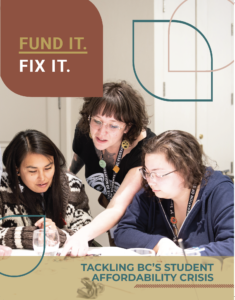The British Columbia Federation of Students (BCFS) is aiming to freeze student tuition with its Fund It, Fix It campaign. The campaign also recommends that the provincial government invest an additional $500 million annually for post-secondary-institution operational costs so the institutions don’t have an over-reliance on domestic and international student tuition.
Camosun College Student Society (CCSS) external executive Jagjeet Singh has been working to spread awareness about the campaign and its benefits to students.
Singh points out that Camosun students might be unaware that the provincial government is supplying 41.1 percent of the funding for post-secondary institutions when, in 1980, they provided 80 percent. Singh says that the Fund It, Fix It campaign wants to see tuition become more affordable for students, and the solution is more government funding.

“We want the government to provide the funding that they have not for years, that’s one of the things. We would like the tuition to be frozen where it is right now… Because it’s not sustainable for a lot of our students,” says Singh.
Because the provincial government has decoupled funding from inflation, Singh says many students are experiencing financial hardships while trying to gain an education.
“We hear all the time stories about students not having food,” says Singh. “Last year, we were doing a food drive, and a student showed up saying, ‘Oh, the only thing I’ve been having for the past few months is popcorn because that’s cheap.’ So, they were just living off popcorn… Some of them live in their cars, they cannot afford rentals. And you know how the market right now is, it’s really, really expensive for a student to sustain in these markets.”
Additionally, the Fund It, Fix It campaign suggests a cap on international student tuition increases (domestic students currently have an annual two-percent cap, but there isn’t one for international students). The campaign also calls for a better strategy for welcoming international students into Canada.
“The importance of international education strategies,” says Singh, “is that it sets guidelines for post-secondary institutions, so that when they are bringing in new students, how do you treat them? How do you make sure that they get a home when they’re here? How do you make sure that they come prepared to live their life in a whole new world, right? A lot of them come in from very different societies, which have a really, really different culture… So having those things around having a set guideline for that.”
To bring more awareness to the campaign, Singh attended the BCFS Advocacy Week in October, where he spoke with local MLAs and informed them about the students struggling in their municipalities.
“Fund It, Fix It, we have been doing it for a few years now,” says Singh. “Obviously, putting in these asks, we created a lobby document for every year. So, we had the capacity to present it in October this year when we did our BC Federation of Students lobby week. So we were down at the parliament, meeting the local MLAs.”
The government issued a funding review in response to the current funding model not supplying sufficient financial support for students.
“The most important recommendation that we have is the funding model review to be published,” he says. “So universities, colleges, the administration of these universities and colleges, student societies, everyone participated in the funding review that hasn’t been released. They are reviewing it at this point… We have been patiently waiting for the funding review to be published. Once that has been published, obviously, we would hope that government starts on working towards a new funding model or fixing the things that are missing in the funding.”
See funditfixit.ca for more information on the campaign.
